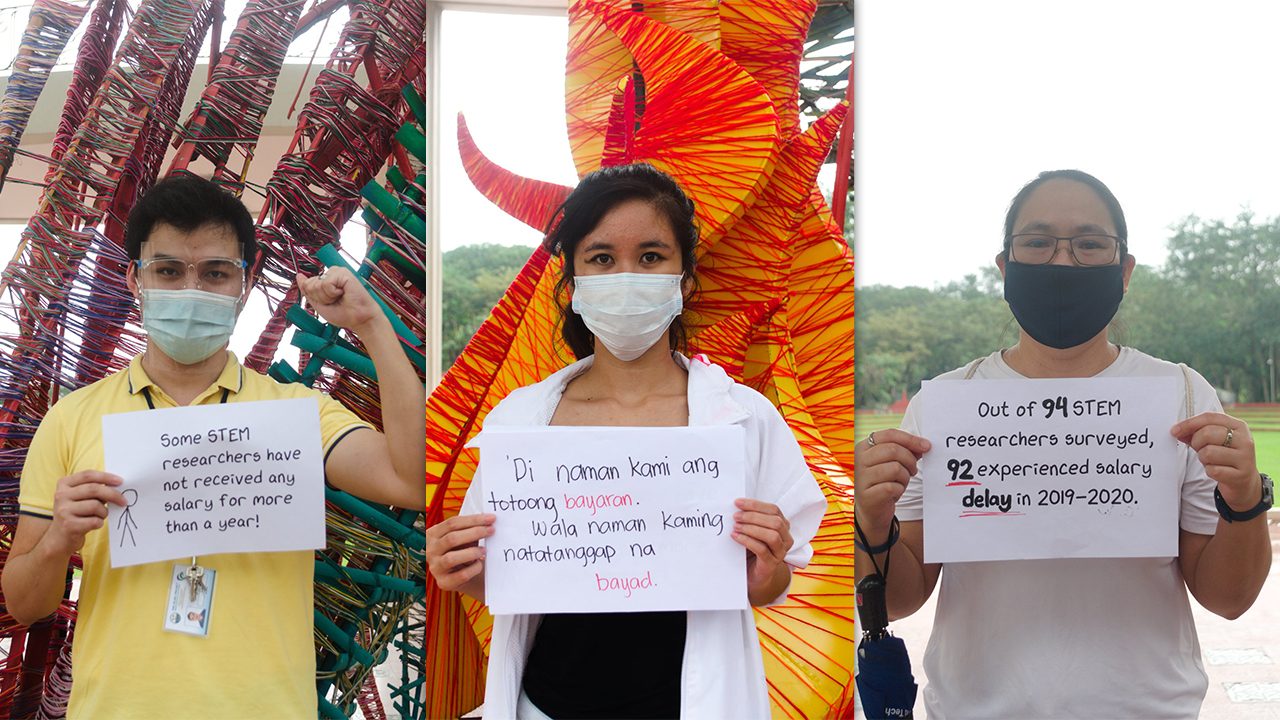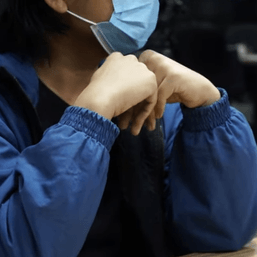SUMMARY
This is AI generated summarization, which may have errors. For context, always refer to the full article.

After several of its research assistants (RA) appealed for a timely release of salaries following months-long delays, the University of the Philippines (UP) Diliman administration said on Monday, December 14, that it is working to facilitate immediate relief for those affected.
An alliance of STEM (science, technology, engineering, and mathematics) workers in UP earlier came forward about their experiences of recurring and extensive delays in the release of their salaries. These include research assistants, laboratory aids, and technicians, among others who have been contracted for externally-funded projects.
In its letter to the UP Diliman Chancellor Fidel Nemenzo on December 4, the Alliance of STEM Graduate Students and Workers-UP Diliman said that these workers went an average of 7 months without receiving pay in 2020.
Citing its preliminary survey on STEM workers in UP, the alliance said that release of salaries was delayed by an average of 4 months in 2019, with some taking as long as a year. Aside from that, many of these workers are under contract-based agreements.
This has pushed the alliance to call on the university administration to intervene and bridge funds to projects where budget delivery may be delayed. In its letter to Nemenzo, the alliance attributed the salary delay to long bureaucratic processes for the approval of the funding.
“During this pandemic and recent catastrophic calamities such as consecutive storms, volcanic eruptions, and earthquakes, such delays are crucial and can directly impact the survival of these workers and their families,” the alliance said.
Jean*, a research assistant at the UP Marine Science Institute who’s been handling projects for about 8 years, said the salary delay has become commonplace among them. Until now, Jean has yet to receive her salaries for October and November.
Despite the salary delay, Jean said many opt to stay since a majority of the research assistants are also graduate students in need of exposure and access to research and experiments.
“I did actually initially try to leave my job…[but] It’s extremely hard to continue your studies and your thesis especially in STEM because it involves a lot of experiments. Because I’m in the life sciences, it involves a lot of live subjects, and you can’t just leave it. You can’t just take a night job or decide you can study at night. You have to be very much involved with your laboratory all the time,” Jean said.
Justin Custado, a core member of the alliance and a research assistant at the UP Marine Science Institute, added that being a research assistant can be convenient for those taking graduate courses since a typical day job may coincide with classes.
Jean said the constant salary delays have forced several research assistants to look for more stable jobs instead. Others also opt to go abroad.
“The number of jobs available to us are actually pretty limited considering we’re all specialists. So mostly, when we can’t get jobs in the Philippines, we end up going abroad because there’s nowhere else to go,” she said.
“The people that you see here are the people who have persisted here for passion. But I can tell you that a lot of RAs and graduate students [also] give up their dreams or their careers in science to find something a lot more stable,” Jean said.
Jean added how many others like her sometimes take part-time or freelance jobs online just to get by.
“Since there are problems like this, it becomes a privilege to stay, which should not be happening given that we lack scientists as a whole in the country,” said Custado.
This issue with salary delays is in stark contrast to Department of Environment and Natural Resources Undersecretary Benny Antiporda’s comments about experts from UP Marine Science Institute and UP Institute of Biology. In October, he had called experts from UP “bayaran” after they criticized the Manila Bay white sand project and suggested steps to rehabilitate the area.
In a bid to help STEM workers in UP, the alliance urged the administration for a dialogue to come up with solutions.
“We want [UP] to have the same level of understanding about the plight of STEM workers. It’s not us against UP, it’s UP with us. It’s supposed to be a collaborative way to discuss reforms, policies. The problems aren’t just with UP, it’s outside also UP. But we want to emphasize also that UP as an institute can find ways to enact long-term solutions to the systemic problems, and find more immediate solutions for its workers,” Custado said.
Heeding the concerns of the alliance, Nemenzo acknowledged the “systemic problem” of the delayed release of salaries of many research assistants and those who come from the STEM fields.
“The pain and anxiety that this has caused our researchers is unacceptable and does not reflect the university’s high regard of them,” Nemenzo said.
In his statement on Monday, Nemenzo said university officials have been working overtime to clear bottlenecks and streamline approval processes, which will allow UP Diliman to pay research assistants’ salaries by the end of the week.
Hoping to put in place long-term reforms to address “administrative inefficiencies and strengthen coordination with funders,” the university is considering the establishment of a bridging fund and the assignment of a dedicated team to manage research projects.
Nemenzo said it will be working to understand the issue of payment delays, especially UP Diliman lecturers and teaching associates also experience the same thing.
“There is no fast and easy remedy, especially amid the current pandemic situation, but we will be engaging in continuous dialogue with all stakeholders to help understand the problem and ensure that everyone is compensated in a timely manner in the future,” he said. – Rappler.com
*Name has been changed for privacy.
Add a comment
How does this make you feel?





There are no comments yet. Add your comment to start the conversation.